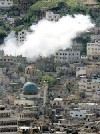
Abed Omar Qusini/Reuters
The Israeli occupation army started to destroy homes in the ancient old city, also known as al-Kasaba, just like they did in the old city of Bethlehem, “to make room for their tanks”, as somebody told me. As in every other Palestinian city, there is lack of food and medicines and there are currently eighty Palestinians rounded up in Rafiedia, also known as “the Champs Elysee of Nablus”, Jabl Shamali, Khalas al-Amud, and my old neighborhood, Ras al-Ain.
Apache helicopters have shelled Dawar Hussain, the main square of the city and neighboring streets. The old city, al-Kasaba, the narrow streets, alleyways and tunnels is living up to its reputation. It reminds many of the early days of the first, or actually second Intifada of the late 80s, early 90s. The wall around the old city have been surrounded by Israeli tanks ever since the Israeli forces entered the place of my origin. Before Israeli forces entered the town, I heard friends in Nablus saying that the main mosques were turned into medical centers. I just heard that Israeli forces raided Najah National University and turned it into a military base.
It seemed, that this morning, between 4 o’clock in the morning and 8 o’clock, the Israeli army had put a curfew on the neighborhood I currently live, Dahiya al-Barid. We haven’t noticed it. They have arrested two residents, next to the home of a colleague. Yesterday afternoon, we could see some armored personnel carriers from the window of the office. At the office I’m contacting media about a press conference which will be held tomorrow, April 7, at 11 o’clock in the Ambassador Hotel in East Jerusalem. At the press conference, speakers from Amnesty International, Human Rights Watch, International Federation of Human Rights, International Committee of Jurists, World Organization Against Torture, Euro-Mediterranean Human Rights Network, Reporters without Borders, and Médecins Sans Frontieres. The speakers will be introduced by the directors of B’Tselem, an Israeli human rights organization, and LAW.





